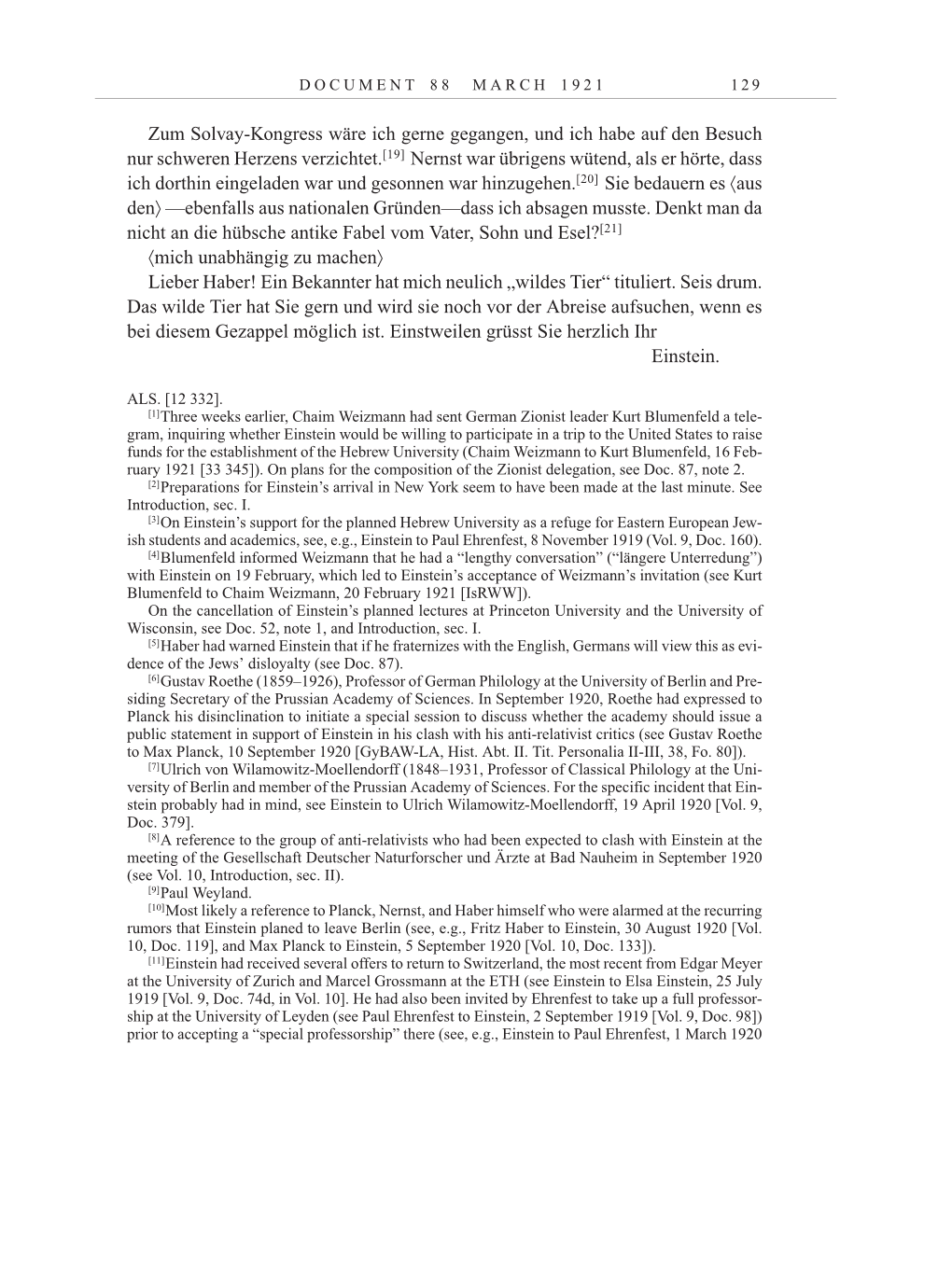D O C U M E N T 8 8 M A R C H 1 9 2 1 1 2 9
Zum Solvay-Kongress wäre ich gerne gegangen, und ich habe auf den Besuch
nur schweren Herzens
verzichtet.[19]
Nernst war übrigens wütend, als er hörte, dass
ich dorthin eingeladen war und gesonnen war
hinzugehen.[20]
Sie bedauern es aus
den —ebenfalls aus nationalen Gründen—dass ich absagen musste. Denkt man da
nicht an die hübsche antike Fabel vom Vater, Sohn und
Esel?[21]
mich unabhängig zu machen
Lieber Haber! Ein Bekannter hat mich neulich „wildes Tier“ tituliert. Seis drum.
Das wilde Tier hat Sie gern und wird sie noch vor der Abreise aufsuchen, wenn es
bei diesem Gezappel möglich ist. Einstweilen grüsst Sie herzlich Ihr
Einstein.
ALS. [12 332].
[1]Three weeks earlier, Chaim Weizmann had sent German Zionist leader Kurt Blumenfeld a tele-
gram, inquiring whether Einstein would be willing to participate in a trip to the United States to raise
funds for the establishment of the Hebrew University (Chaim Weizmann to Kurt Blumenfeld, 16 Feb-
ruary 1921 [33 345]). On plans for the composition of the Zionist delegation, see Doc. 87, note 2.
[2]Preparations for Einstein’s arrival in New York seem to have been made at the last minute. See
Introduction, sec. I.
[3]On Einstein’s support for the planned Hebrew University as a refuge for Eastern European Jew-
ish students and academics, see, e.g., Einstein to Paul Ehrenfest, 8 November 1919 (Vol. 9, Doc. 160).
[4]Blumenfeld informed Weizmann that he had a “lengthy conversation” (“längere Unterredung”)
with Einstein on 19 February, which led to Einstein’s acceptance of Weizmann’s invitation (see Kurt
Blumenfeld to Chaim Weizmann, 20 February 1921 [IsRWW]).
On the cancellation of Einstein’s planned lectures at Princeton University and the University of
Wisconsin, see Doc. 52, note 1, and Introduction, sec. I.
[5]Haber had warned Einstein that if he fraternizes with the English, Germans will view this as evi-
dence of the Jews’ disloyalty (see Doc. 87).
[6]Gustav Roethe (1859–1926), Professor of German Philology at the University of Berlin and Pre-
siding Secretary of the Prussian Academy of Sciences. In September 1920, Roethe had expressed to
Planck his disinclination to initiate a special session to discuss whether the academy should issue a
public statement in support of Einstein in his clash with his anti-relativist critics (see Gustav Roethe
to Max Planck, 10 September 1920 [GyBAW-LA, Hist. Abt. II. Tit. Personalia II-III, 38, Fo. 80]).
[7]Ulrich von Wilamowitz-Moellendorff (1848–1931, Professor of Classical Philology at the Uni-
versity of Berlin and member of the Prussian Academy of Sciences. For the specific incident that Ein-
stein probably had in mind, see Einstein to Ulrich Wilamowitz-Moellendorff, 19 April 1920 [Vol. 9,
Doc. 379].
[8]A reference to the group of anti-relativists who had been expected to clash with Einstein at the
meeting of the Gesellschaft Deutscher Naturforscher und Ärzte at Bad Nauheim in September 1920
(see Vol. 10, Introduction, sec. II).
[9]Paul Weyland.
[10]Most likely a reference to Planck, Nernst, and Haber himself who were alarmed at the recurring
rumors that Einstein planed to leave Berlin (see, e.g., Fritz Haber to Einstein, 30 August 1920 [Vol.
10, Doc. 119], and Max Planck to Einstein, 5 September 1920 [Vol. 10, Doc. 133]).
[11]Einstein had received several offers to return to Switzerland, the most recent from Edgar Meyer
at the University of Zurich and Marcel Grossmann at the ETH (see Einstein to Elsa Einstein, 25 July
1919 [Vol. 9, Doc. 74d, in Vol. 10]. He had also been invited by Ehrenfest to take up a full professor-
ship at the University of Leyden (see Paul Ehrenfest to Einstein, 2 September 1919 [Vol. 9, Doc. 98])
prior to accepting a “special professorship” there (see, e.g., Einstein to Paul Ehrenfest, 1 March 1920
